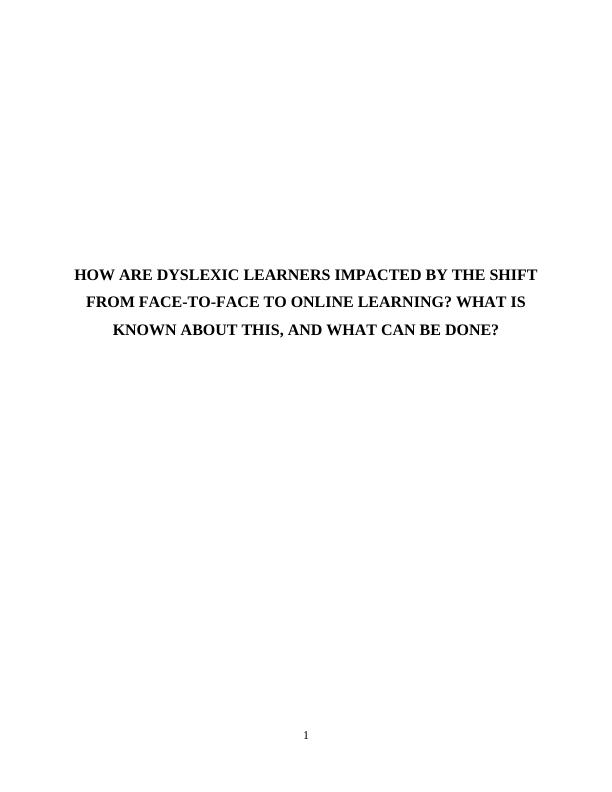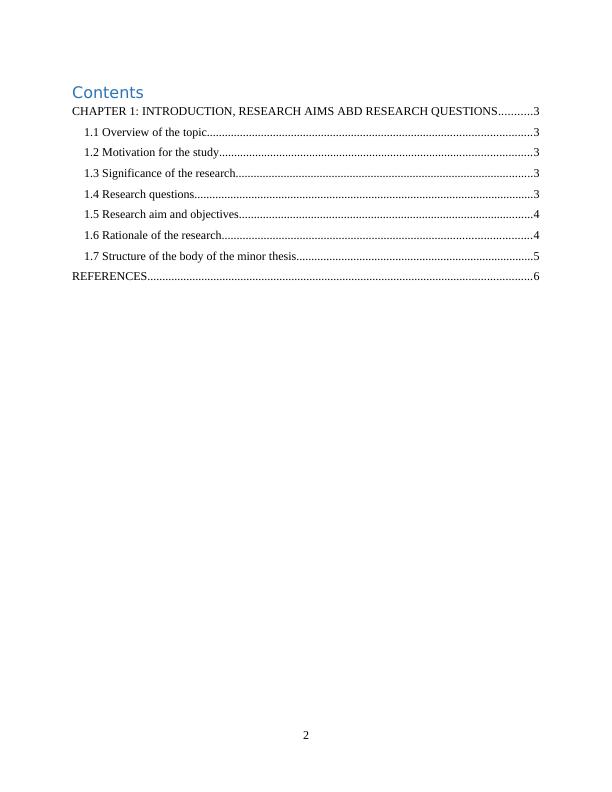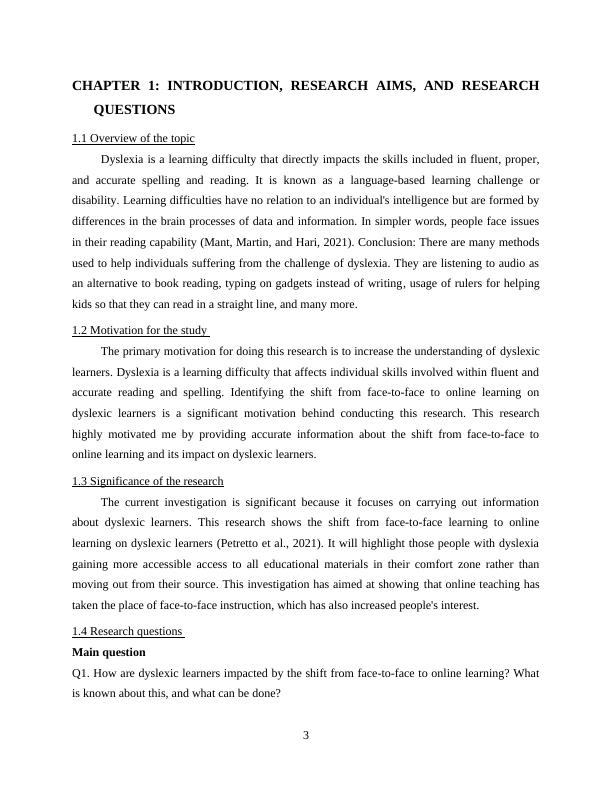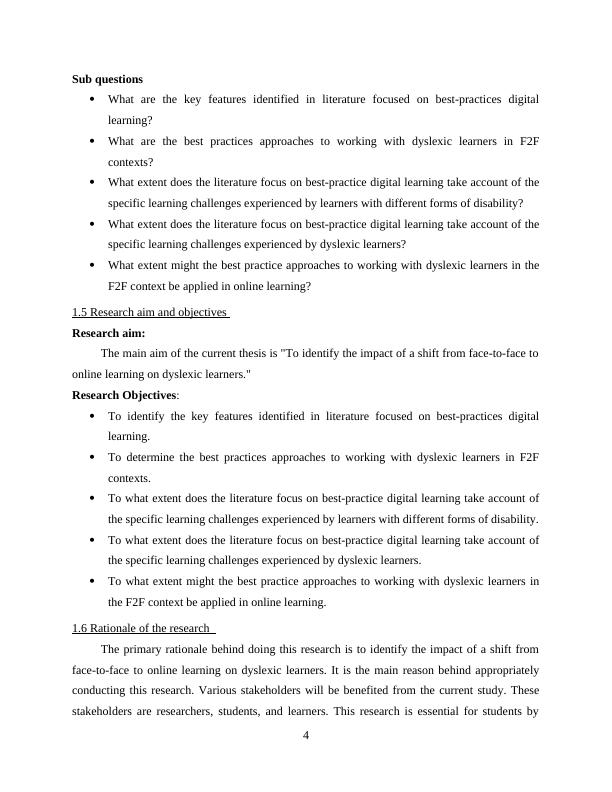Impact of Shift from Face-to-Face to Online Learning on Dyslexic Learners
Added on 2023-06-14
14 Pages4552 Words470 Views
HOW ARE DYSLEXIC LEARNERS IMPACTED BY THE SHIFT
FROM FACE-TO-FACE TO ONLINE LEARNING? WHAT IS
KNOWN ABOUT THIS, AND WHAT CAN BE DONE?
1
FROM FACE-TO-FACE TO ONLINE LEARNING? WHAT IS
KNOWN ABOUT THIS, AND WHAT CAN BE DONE?
1

Contents
CHAPTER 1: INTRODUCTION, RESEARCH AIMS ABD RESEARCH QUESTIONS...........3
1.1 Overview of the topic............................................................................................................3
1.2 Motivation for the study........................................................................................................3
1.3 Significance of the research...................................................................................................3
1.4 Research questions.................................................................................................................3
1.5 Research aim and objectives..................................................................................................4
1.6 Rationale of the research.......................................................................................................4
1.7 Structure of the body of the minor thesis...............................................................................5
REFERENCES................................................................................................................................6
2
CHAPTER 1: INTRODUCTION, RESEARCH AIMS ABD RESEARCH QUESTIONS...........3
1.1 Overview of the topic............................................................................................................3
1.2 Motivation for the study........................................................................................................3
1.3 Significance of the research...................................................................................................3
1.4 Research questions.................................................................................................................3
1.5 Research aim and objectives..................................................................................................4
1.6 Rationale of the research.......................................................................................................4
1.7 Structure of the body of the minor thesis...............................................................................5
REFERENCES................................................................................................................................6
2

CHAPTER 1: INTRODUCTION, RESEARCH AIMS, AND RESEARCH
QUESTIONS
1.1 Overview of the topic
Dyslexia is a learning difficulty that directly impacts the skills included in fluent, proper,
and accurate spelling and reading. It is known as a language-based learning challenge or
disability. Learning difficulties have no relation to an individual's intelligence but are formed by
differences in the brain processes of data and information. In simpler words, people face issues
in their reading capability (Mant, Martin, and Hari, 2021). Conclusion: There are many methods
used to help individuals suffering from the challenge of dyslexia. They are listening to audio as
an alternative to book reading, typing on gadgets instead of writing, usage of rulers for helping
kids so that they can read in a straight line, and many more.
1.2 Motivation for the study
The primary motivation for doing this research is to increase the understanding of dyslexic
learners. Dyslexia is a learning difficulty that affects individual skills involved within fluent and
accurate reading and spelling. Identifying the shift from face-to-face to online learning on
dyslexic learners is a significant motivation behind conducting this research. This research
highly motivated me by providing accurate information about the shift from face-to-face to
online learning and its impact on dyslexic learners.
1.3 Significance of the research
The current investigation is significant because it focuses on carrying out information
about dyslexic learners. This research shows the shift from face-to-face learning to online
learning on dyslexic learners (Petretto et al., 2021). It will highlight those people with dyslexia
gaining more accessible access to all educational materials in their comfort zone rather than
moving out from their source. This investigation has aimed at showing that online teaching has
taken the place of face-to-face instruction, which has also increased people's interest.
1.4 Research questions
Main question
Q1. How are dyslexic learners impacted by the shift from face-to-face to online learning? What
is known about this, and what can be done?
3
QUESTIONS
1.1 Overview of the topic
Dyslexia is a learning difficulty that directly impacts the skills included in fluent, proper,
and accurate spelling and reading. It is known as a language-based learning challenge or
disability. Learning difficulties have no relation to an individual's intelligence but are formed by
differences in the brain processes of data and information. In simpler words, people face issues
in their reading capability (Mant, Martin, and Hari, 2021). Conclusion: There are many methods
used to help individuals suffering from the challenge of dyslexia. They are listening to audio as
an alternative to book reading, typing on gadgets instead of writing, usage of rulers for helping
kids so that they can read in a straight line, and many more.
1.2 Motivation for the study
The primary motivation for doing this research is to increase the understanding of dyslexic
learners. Dyslexia is a learning difficulty that affects individual skills involved within fluent and
accurate reading and spelling. Identifying the shift from face-to-face to online learning on
dyslexic learners is a significant motivation behind conducting this research. This research
highly motivated me by providing accurate information about the shift from face-to-face to
online learning and its impact on dyslexic learners.
1.3 Significance of the research
The current investigation is significant because it focuses on carrying out information
about dyslexic learners. This research shows the shift from face-to-face learning to online
learning on dyslexic learners (Petretto et al., 2021). It will highlight those people with dyslexia
gaining more accessible access to all educational materials in their comfort zone rather than
moving out from their source. This investigation has aimed at showing that online teaching has
taken the place of face-to-face instruction, which has also increased people's interest.
1.4 Research questions
Main question
Q1. How are dyslexic learners impacted by the shift from face-to-face to online learning? What
is known about this, and what can be done?
3

Sub questions
What are the key features identified in literature focused on best-practices digital
learning?
What are the best practices approaches to working with dyslexic learners in F2F
contexts?
What extent does the literature focus on best-practice digital learning take account of the
specific learning challenges experienced by learners with different forms of disability?
What extent does the literature focus on best-practice digital learning take account of the
specific learning challenges experienced by dyslexic learners?
What extent might the best practice approaches to working with dyslexic learners in the
F2F context be applied in online learning?
1.5 Research aim and objectives
Research aim:
The main aim of the current thesis is "To identify the impact of a shift from face-to-face to
online learning on dyslexic learners."
Research Objectives:
To identify the key features identified in literature focused on best-practices digital
learning.
To determine the best practices approaches to working with dyslexic learners in F2F
contexts.
To what extent does the literature focus on best-practice digital learning take account of
the specific learning challenges experienced by learners with different forms of disability.
To what extent does the literature focus on best-practice digital learning take account of
the specific learning challenges experienced by dyslexic learners.
To what extent might the best practice approaches to working with dyslexic learners in
the F2F context be applied in online learning.
1.6 Rationale of the research
The primary rationale behind doing this research is to identify the impact of a shift from
face-to-face to online learning on dyslexic learners. It is the main reason behind appropriately
conducting this research. Various stakeholders will be benefited from the current study. These
stakeholders are researchers, students, and learners. This research is essential for students by
4
What are the key features identified in literature focused on best-practices digital
learning?
What are the best practices approaches to working with dyslexic learners in F2F
contexts?
What extent does the literature focus on best-practice digital learning take account of the
specific learning challenges experienced by learners with different forms of disability?
What extent does the literature focus on best-practice digital learning take account of the
specific learning challenges experienced by dyslexic learners?
What extent might the best practice approaches to working with dyslexic learners in the
F2F context be applied in online learning?
1.5 Research aim and objectives
Research aim:
The main aim of the current thesis is "To identify the impact of a shift from face-to-face to
online learning on dyslexic learners."
Research Objectives:
To identify the key features identified in literature focused on best-practices digital
learning.
To determine the best practices approaches to working with dyslexic learners in F2F
contexts.
To what extent does the literature focus on best-practice digital learning take account of
the specific learning challenges experienced by learners with different forms of disability.
To what extent does the literature focus on best-practice digital learning take account of
the specific learning challenges experienced by dyslexic learners.
To what extent might the best practice approaches to working with dyslexic learners in
the F2F context be applied in online learning.
1.6 Rationale of the research
The primary rationale behind doing this research is to identify the impact of a shift from
face-to-face to online learning on dyslexic learners. It is the main reason behind appropriately
conducting this research. Various stakeholders will be benefited from the current study. These
stakeholders are researchers, students, and learners. This research is essential for students by
4

End of preview
Want to access all the pages? Upload your documents or become a member.
Related Documents
Causal Theories and Definitions of Dyslexialg...
|12
|1042
|27
Applied Research Project: Dyslexialg...
|14
|3871
|34
Education for Learners With Dyslexialg...
|7
|1630
|89
Literature Review : Effectiveness of Inclusive Education to Dyslexic Learnerslg...
|16
|5073
|413
Dyslexia in Registered Nurses: Meeting Educational Needs and Filling Knowledge Gapslg...
|8
|1716
|481
Academic Study Skillslg...
|11
|3522
|199
